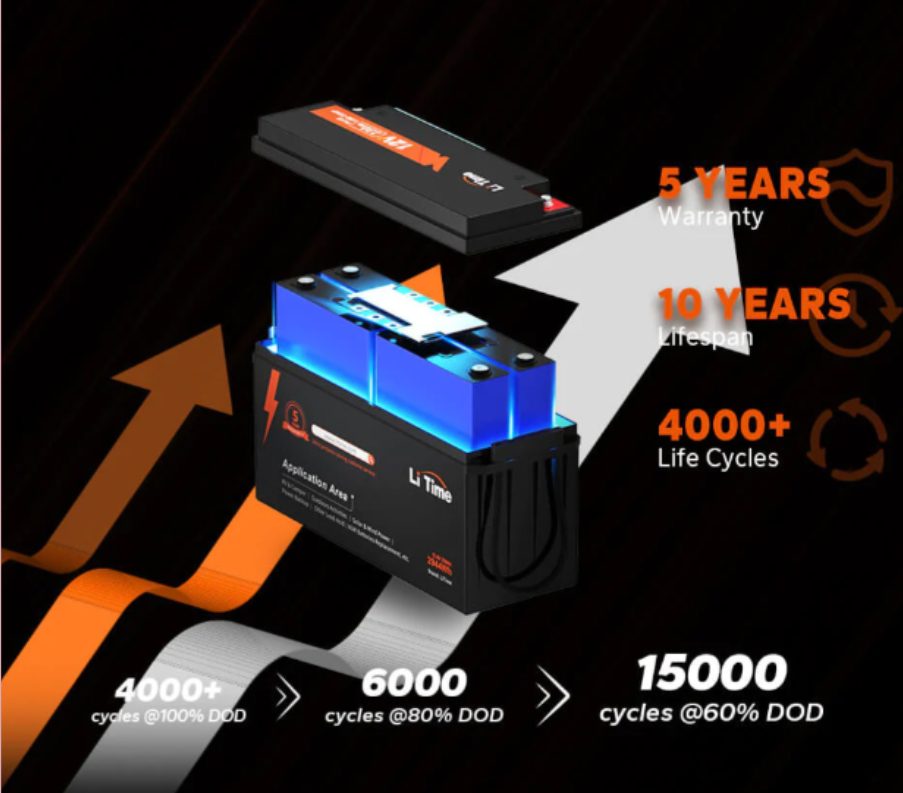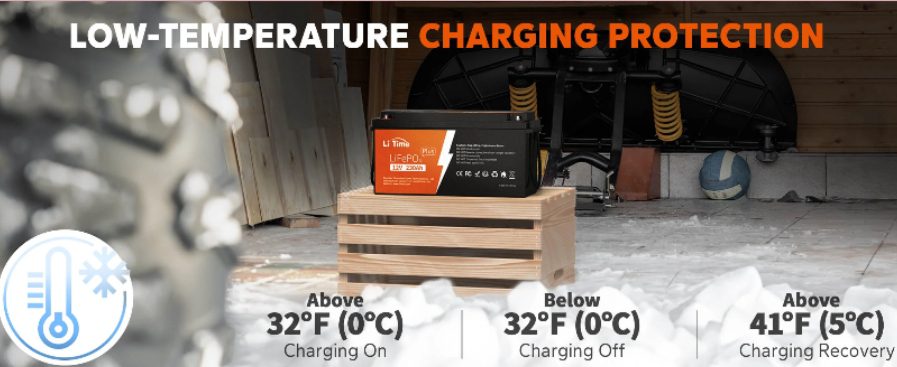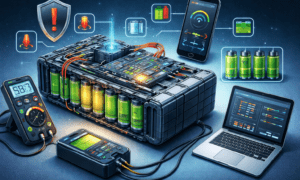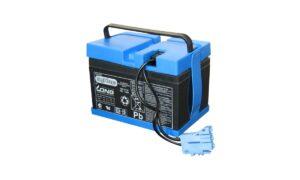Cold weather can be detrimental to the performance and lifespan of your lithium battery. When temperatures drop, the chemical reactions within the battery slow down, leading to a reduced capacity and eventually causing it to die unexpectedly. Understanding the impact of low temperatures on your battery can help you take preemptive measures and ensure a hassle-free winter driving experience.
How Cold Weather Affects Lithium Battery Performance
Low temperatures restrict the ability of a battery to generate electricity efficiently. The cold slows down the chemical reactions taking place inside the battery, making it harder to produce the same amount of power. As a result, the battery’s capacity diminishes, and it struggles to perform essential functions like starting the engine, operating lights, or powering heating systems.
Here are a few ways cold weather affects lithium battery performance:
Reduced capacity: The capacity of a lithium battery decreases in cold weather. This means that the battery will not be able to hold as much charge as it would in warmer temperatures. As a result, the battery will run out more quickly and require more frequent recharging.
Slower chemical reactions: Cold temperatures slow down the chemical reactions that occur within the battery. This can result in a decreased flow of electrons and a lower current output. It may also increase internal resistance, causing voltage drops and limiting power delivery.
Increased internal resistance: Cold temperatures can increase the internal resistance of a lithium battery. This makes it more difficult for the battery to deliver power, as a greater amount of energy is lost and converted into heat within the battery itself. This can lead to decreased performance and lower overall efficiency.
Reduced charging efficiency: Cold weather can reduce the efficiency of charging a lithium battery, as the lower temperature limits the ability of the battery to accept charge. This can result in longer charging times and lower overall charging capacity.
Potential damage: Exposing a lithium battery to extremely cold temperatures for an extended period of time can potentially cause irreversible damage. This can result in reduced capacity and overall performance.
To mitigate the impact of cold weather on lithium battery performance, it is recommended to keep the batteries at a moderate temperature range whenever possible. This can be achieved by insulating the battery, using battery heaters or blankets, or simply keeping the battery in a warm environment.
Why Cold Weather Affects? Lithium Battery Chemical Reactions in Cold Temperatures
Lithium batteries operate based on a process called electrochemical reaction. During the discharge process, lithium ions move from the negative electrode (anode) to the positive electrode (cathode) through an electrolyte, generating an electrical current. When the battery is being charged, the opposite happens, with lithium ions moving back from the cathode to the anode.
In cold weather, the chemical reactions within lithium batteries slow down, impacting their performance. This leads to a phenomenon called lithium plating, where the lithium ions coat the anode, increasing resistance and limiting the availability of ions to generate electricity. As a result, the battery’s capacity can decrease by 20-30%, although it should ideally operate at 95-98% of its rated capacity.
Temperature Limits to Lithium Battery
Understanding the temperature limits for lithium batteries is crucial when using them in equipment that experiences wide temperature ranges. While the optimal range for lithium batteries is -4°F to 140°F, it is important to only charge them within the range of 32°F to 131°F (0°C to 55°C) for maximum safety. Temperatures higher than these can pose a risk of explosion, so it is important to check the temperature before charging to ensure it falls within the safe range.
When it comes to cold temperatures, any temperature below 32°F can cause significant damage to lithium batteries. Charging lithium batteries below freezing point slows down the chemical reactions to a point where little usable energy is produced. Ultimately, this can lead to the batteries ceasing to function altogether.
If you plan to use lithium batteries in sub-freezing temperatures, it is best to avoid charging them as it can cause permanent damage.
What is Low-Temperature Protection
Low-temperature protection refers to measures or technologies implemented to safeguard batteries and other electrical components from the adverse effects of cold weather. It involves implementing systems and features that help maintain the performance and functionality of batteries in low-temperature environments. These protections can include insulation, heating elements, temperature monitoring, and special charging protocols. The goal is to prevent damage or degradation to the battery, maintain its efficiency, and ensure reliable operation in cold weather conditions.
The Importance of Low Temperature Protection to lithium battery
Low temperature protection is of great importance to lithium batteries because they are highly sensitive to extreme temperatures. Here are some reasons why:
Battery Performance: Cold temperatures can significantly affect the performance of lithium batteries. At low temperatures, the internal resistance of the battery increases, resulting in reduced capacity and power output. This can lead to poor battery performance, especially in applications requiring high power or long runtimes, such as electric vehicles.
Safety: Operating lithium batteries at low temperatures can pose safety risks. When the battery is exposed to freezing temperatures, the electrolyte inside can freeze, leading to the expansion of the battery casing and potential damage to the internal components. In extreme cases, the frozen electrolyte can cause internal short circuits or ruptures, resulting in fire or explosion hazards.
Battery Lifespan: Cold temperatures can have a negative impact on the overall lifespan of lithium batteries. The freezing and expansion of the electrolyte can cause structural damage, which can lead to a decrease in the battery’s cycle life and overall capacity. Furthermore, the reduced performance at low temperatures may encourage users to perform aggressive charging or discharging, which can further degrade the battery’s lifespan.
Reliability: Low temperature protection ensures the reliability of lithium batteries in various applications. For example, in remote locations or during outdoor activities, where temperatures can drop considerably, reliable battery performance is essential. Without proper low-temperature protection, the batteries may fail, leading to the loss of power supply or operational disruptions.
5 Tips to Keep Your Batteries Warm in Winter
Here are some tips for keeping your batteries warm in winter:
Store batteries indoors
If possible, store your batteries in a temperature-controlled environment indoors. This will help maintain a consistent temperature and prevent them from getting too cold.
Insulate battery compartments
If you have batteries installed in equipment or vehicles, insulate the battery compartments to provide some insulation against the cold. You can use insulation materials such as foam or blankets to help retain heat.
Use battery blankets or warmers
Battery blankets or warmers are designed to provide heat to batteries in cold temperatures. These devices wrap around the battery and provide a gentle heat source to keep them warm. Make sure to use products specifically designed for your battery type.
Keep batteries connected to a power source
If possible, keep your batteries connected to a power source, such as a battery maintainer or trickle charger, during periods of inactivity. This will help keep the batteries warm, as the charger will provide a small amount of power and generate heat.
Limit battery exposure to extreme cold
Minimize the exposure of your batteries to extremely cold temperatures. If using battery-powered devices outdoors in winter, try to keep them insulated or protected from the elements to prevent rapid temperature drops.
Remember that extreme cold temperatures can still have an impact on battery performance, even with these precautions. It’s always best to check the manufacturer’s guidelines for specific temperature ranges and recommendations for your batteries.
Batteries with Low-Temperature Protection Recommended
If you live in the area where the winter is long, it’s highly recommended to use LiFePO4 batteries like LiTime 12V 100Ah TM and LiTime 12V 230Ah Plus which have low-temperature protection. These batteries are specifically designed to perform well even in extremely cold weather. They have features that prevent capacity loss, power reduction, and potential safety hazards.
They have built-in low-temperature charging protection that will auto-cut the battery off from charging when the cell temperature is lower than 32℉, preventing the battery cells from being damaged from charging under the freezing point.
Experience peace of mind with A-level LiFePO4 battery cells, which are free from mercury, lead, and other toxic substances. ABS flame-retardant plastic and IP65 waterproof level provide protection against fire and water. LiFePO4 batteries also have a longer lifespan compared to other lithium-ion batteries. With a lifespan of over 10 years and more than 4000 cycles at 100% depth of discharge (DOD), they are reliable and durable. This means you won’t have to replace your batteries frequently, saving you money in the long run.
Besides, the batteries are equipped with upgraded BMS, except for the protection from over-charging, over-discharging, short-circuit, over-current and overheating, they also provide extra protection of moisture-proof, dust-proof and salt-spray-resistant to ensure the batteries can withstand harsh weather conditions and extended use. This makes them suitable for a variety of applications, including RVs, boats, solar power systems, and off-grid power storage.
So, if you’re looking for long-lasting, safe, and reliable power for RV/Marine in cold climates, consider LiFePO4 batteries with low-temperature protection. These batteries will not only meet your power needs but also provide you with peace of mind knowing that your batteries can withstand harsh weather conditions and provide reliable power storage for years to come.




































